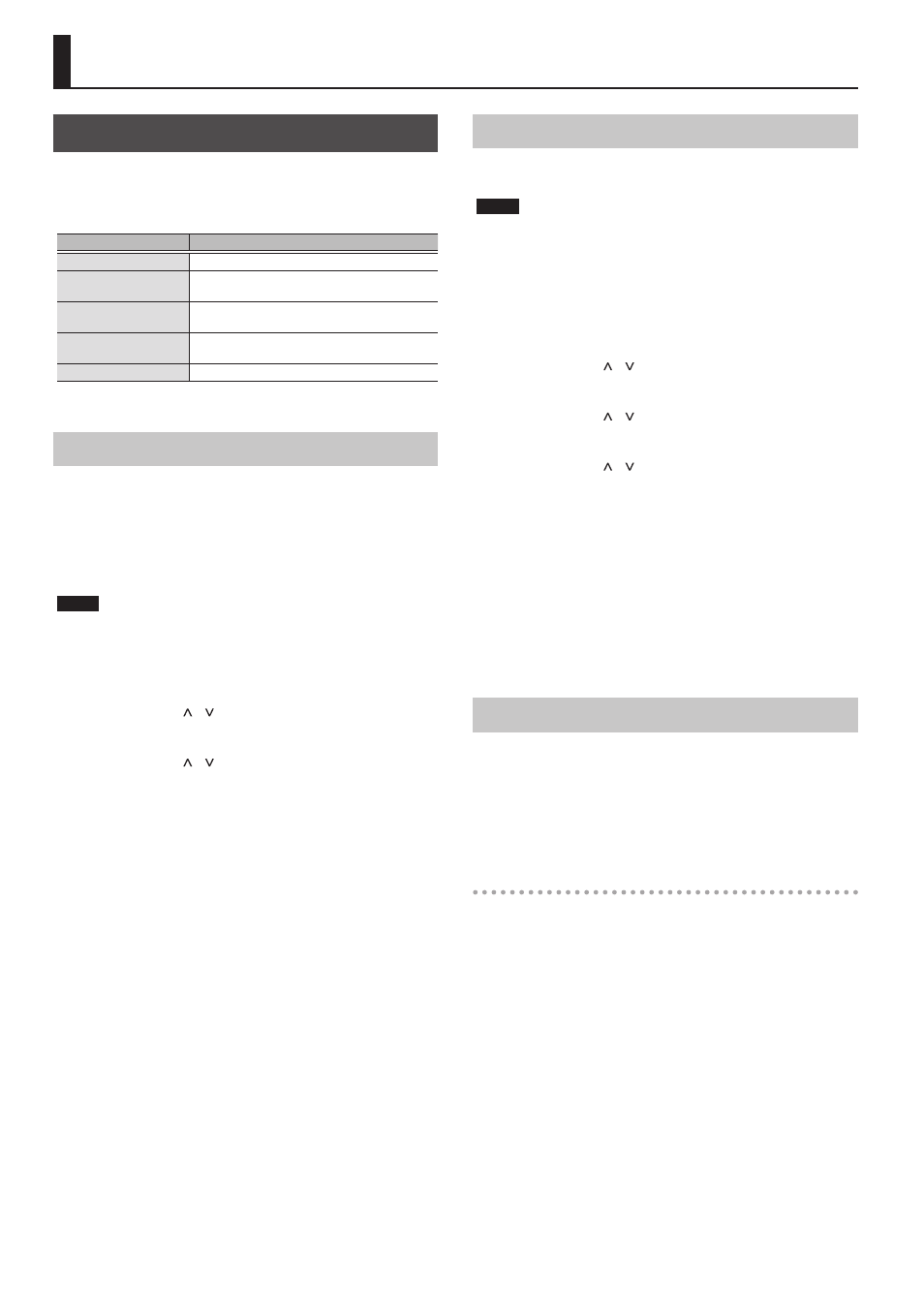Other functions, Convenient functions (utility), Backing up data to usb flash drive (backup) – Roland RD-88 Digital Stage Piano User Manual
Page 24: Restoring backup data (restore), Adding the sounds (import tone), Saving tones to a usb flash drive, Data that is backed up

24
Other Functions
Convenient Functions (UTILITY)
Here you can back up the RD-88’s data to a USB flash drive, or restore
data from a USB flash drive back into the RD-88. You can also use the
“UTILITY” functions to return the RD-88 to its factory-set condition, or
format a USB flash drive.
UTILITY
Explanation
BACKUP
Backs-up user data to a USB flash drive.
RESTORE
Restores backup data from a USB flash drive into the
RD-88.
IMPORT TONE
Import tones saved on a USB flash drive into the
RD-88.
FACTORY RESET
Resets the RD-88’s settings to their factory-set
condition.
FORMAT USB MEMORY
Initializes a USB flash drive.
Backing Up Data to USB Flash Drive (BACKUP)
Here’s how to back up user data to a USB flash drive.
Data that is backed up
5
All Scene data
5
Favorites
5
System settings (including system effects)
NOTE
Never turn off the power or remove the USB flash drives while the
screen indicates “Executing....”
1.
Press the [MENU] button.
2.
Use the cursor [ ] [ ] buttons to select “UTILITY,”
and then press the [ENTER] button.
3.
Use the cursor [ ] [ ] buttons to select “BACKUP,”
and then press the [ENTER] button.
The BACKUP NAME screen appears.
4.
Use the cursor [<] [>] buttons to move the
cursor, and use the [DEC] [INC] buttons to select
characters.
5.
When you’ve specified the file name, press the
[ENTER] button.
A confirmation message appears.
If you decide to cancel, press the [EXIT] button.
6.
To execute, press the [ENTER] button.
When the backup is finished, the screen indicates “Completed!”
If a file of the same name exists, a confirmation screen
(Overwrite?) asks whether you want to overwrite the existing file.
Restoring Backup Data (RESTORE)
Here’s how user data that you backed-up on a USB flash drive can be
returned to the RD-88. This operation is called “restore.”
NOTE
5
All user data are rewritten when you execute the restore operation.
If your RD-88 contains important data, assign it a different name
and back it up to an USB flash drive before you restore.
5
Never turn off the power or remove the USB flash drives while the
screen indicates “Executing....”
1.
Press the [MENU] button.
2.
Use the cursor [ ] [ ] buttons to select “UTILITY,”
and then press the [ENTER] button.
3.
Use the cursor [ ] [ ] buttons to select “RESTORE,”
and then press the [ENTER] button.
4.
Use the cursor [ ] [ ] buttons to select the file that
you want to restore.
5.
Press the [ENTER] button.
A confirmation message appears.
If you decide to cancel, press the [EXIT] button.
6.
To execute, press the [ENTER] button.
When the restore operation is finished, the screen indicates
“Completed. Turn off power.”
7.
Turn the power of the RD-88 off and then on again.
Adding the Sounds (IMPORT TONE)
Tones that you download or tones that you exported from
another unit can be imported into the RD-88 as added tones.
* Here explain how to import user tones. If you want to import/
install a sound pack or wave expansion, refer to "Sound Pack/Wave
Expansion Install Manual" (PDF).
Saving Tones to a USB Flash Drive
* If you’re using the USB flash drive for the first time, format it using
the RD-88.
“Formatting a USB Flash Drive (FORMAT USB MEMORY)”
1.
By downloading or by using the export function
of another unit, obtain an SVZ file containing the
tones that you want to import, and place the file on
your computer.
2.
Connect the USB flash drive to your computer.
3.
Save the SVZ file in the ROLAND/SOUND folder of
the USB flash drive.
4.
Disconnect the USB flash drive from your computer,
and connect it to the RD-88.
